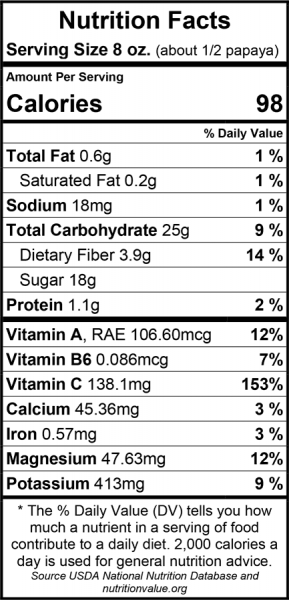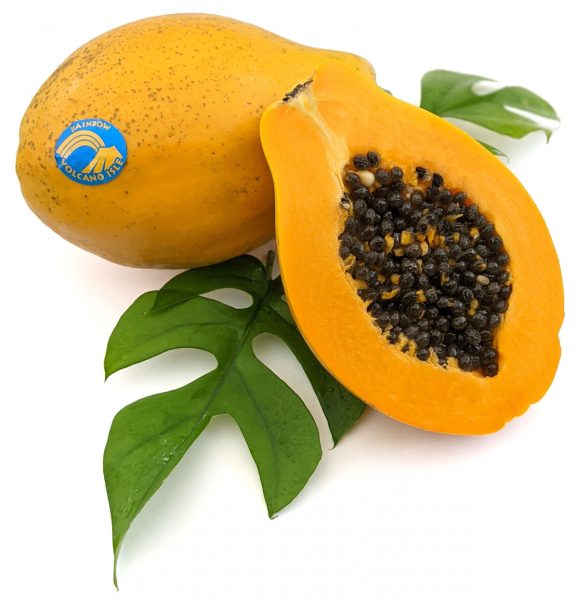Papayas are great source of nutrition, just a single serving gives you 150% of the RDA for vitamin C. They are high in vitamin A, potassium and folate and rich in antioxidants. On top of that - papayas are delicious!
When they turn mostly golden in color and give slightly to gentle pressure.
You will generally receive our papayas at 30-50% yellow skin. Skin color is a good indication of ripeness, but more accurate is their feel. Firm well-colored fruit (50-75% yellow) are excellent for cooking, or dicing for salsa or fruit salad. At this stage they are firm enough to hold their shape, but have developed most of their potential flavor.
A day or two after this cooking/dicing stage, at 75-100% yellow skin and giving to a gentle squeeze, most people find papayas ideal for eating out of shell with a spoon, perhaps with a compatible flavor of lime, yogurt, or your favorite sliced fruit added to the natural bowl of a half papaya.
If for some reason your papaya gets very soft, our favorite use is blended with banana and some orange juice for the best nutritional and tasting drink you've ever had.
Ripeness can be controlled by temperature. A refrigerator will almost totally temporarily stop the ripening process. Long refrigeration time, usually 5 days or more, may allow dehydration of the fruit. Dehydration will appear as a slight shriveling or roughening of the skin. Although unattractive, flavor will generally not be affected. Prolonged refrigeration will also lead to a gray cast to the skin known as chill burn. Commercially papayas should be stored at 52-55 F degrees. Papayas are a tropical fruit and as such they prefer a moderate environment, and certainly not freezing. Prepared fruit (peeled, deseeded and sliced or scooped) does freeze well for some later uses.
Yes. For your environmental safety, our papayas are randomly inspected by the United States Department of Agriculture (USDA), sealed with a tamper resistant seal in an insect proof box, and accompanied by a certificate of treatment. This meets all US government regulation to protect your environment from introduction of alien insect pests.
We treat our papayas for export with the Sure Beam electronic pasteurization technology for your environmental safety.
Because of the possibility of introducing alien insect pests such as fruit flies, all exported fresh fruit must be inspected and/or treated. These are quarantine regulations put in place by most state governments and the Federal government.
Alien species, be they dangerous animals, noxious weeds, aquatic life that destroys native species habitat, new plant of animal diseases, or insects, are some threat to every place on earth. In Hawaii, we live with our plant diseases and insects, but dread new arrivals for their impact on our farm. We are required by USDA to treat each box of papayas sent to the continental USA to render fruit flies harmless.
Of the approved technologies for this treatment process, we have chosen to use the Sure Beam Electronic Pasteurization System. The electrically generated x-rays render fruit flies infertile at the approved minimum x-ray dose. Most other insects, should they have hitchhiked into a box, would also be infertile and thus no longer pose an environmental threat if they don't exist in your area.
Very little heat (about 2 F degrees) is generated in the Sure Beam process, and tests have shown no significant change in nutrition. This process leaves the papayas very much like they were before treatment, but with no possibility of carrying unwanted insects with it.
Papayas have a remarkable level of Vitamin C. For a fruit, their Vitamin A content is very high. Papayas also contain high levels of folate, and important minerals such as calcium, and potassium. The natural enzymes in papayas are well known for their digestibility, and in Hawaii papayas are one of the first foods given to babies.


